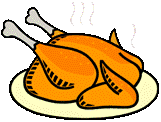Food Science and Technology Department
Date of this Version
February 2002
Abstract
A fed-batch, anaerobic culture system was developed to assess the behavior of Escherichia coli O157:H7 in a rumen-like environment. Fermentation medium consisted of either 50% (vol/vol) raw or sterile rumen fluid and 50% phosphate buffer. Additional rumen fluid was added twice per day, and samples were removed three times per day to simulate the exiting of digesta and microbes from the rumen environment under typical feeding regimens. With both types of medium, anaerobic and enteric bacteria reached 1010 and 104 cells/ml, respectively, and were maintained at these levels for at least 5 days. When a rifampin-resistant strain of E. coli O157:H7 was inoculated into medium containing raw rumen fluid, growth did not occur. In contrast, when this strain was added to sterile rumen fluid medium, cell densities increased from 106 to 109 CFU/ml within 24 h. Most strains of E. coli O157:H7 are unable to ferment sorbitol; therefore, we assessed whether the addition of sorbitol as the only added carbohydrate could be used to competitively exclude E. coli O157:H7 from the culture system. When inoculated into raw rumen broth containing 3 g of sorbitol per liter, E. coli O157:H7 was displaced within 72 h. The addition of other competitive sugars, such as L-arabinose, trehalose, and rhamnose, to rumen medium gave similar results. However, whenever E. coli O157:H7 was grown in sterile rumen broth containing sorbitol, sorbitol-positive mutants appeared. These results suggest that a robust population of commensal ruminal microflora is required to invoke competitive exclusion of E. coli O157:H7 by the addition of “nonfermentable” sugars and that this approach may be effective as a preharvest strategy for reducing carriage of E. coli O157:H7 in the rumen.


Comments
Published in APPLIED AND ENVIRONMENTAL MICROBIOLOGY, Feb. 2002, p. 519–524 Vol. 68, No. 2 2002. Copyright © 2002, American Society for Microbiology. Used by permission.